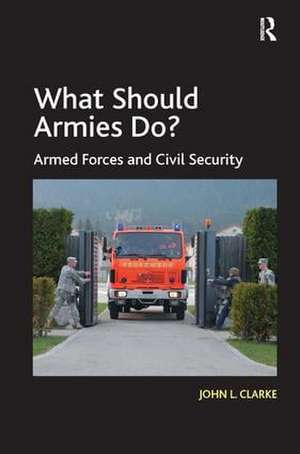What Should Armies Do?: Armed Forces and Civil Security
Autor John L. Clarkeen Limba Engleză Hardback – 17 oct 2014
Preț: 497.62 lei
Preț vechi: 681.15 lei
-27% Nou
Puncte Express: 746
Preț estimativ în valută:
95.22€ • 99.68$ • 78.79£
95.22€ • 99.68$ • 78.79£
Carte tipărită la comandă
Livrare economică 05-19 aprilie
Preluare comenzi: 021 569.72.76
Specificații
ISBN-13: 9781472445261
ISBN-10: 1472445260
Pagini: 176
Dimensiuni: 156 x 234 x 17 mm
Greutate: 0.49 kg
Ediția:1
Editura: Taylor & Francis
Colecția Routledge
Locul publicării:Oxford, United Kingdom
ISBN-10: 1472445260
Pagini: 176
Dimensiuni: 156 x 234 x 17 mm
Greutate: 0.49 kg
Ediția:1
Editura: Taylor & Francis
Colecția Routledge
Locul publicării:Oxford, United Kingdom
Notă biografică
Dr John L. Clarke is Professor of Leadership, Management and Defense Planning at the Marshall Center in Garmisch, Germany.
Recenzii
’What is an army today? Who is a soldier today? What does an army do for its nation? In this book Dr Jack Clarke asks as well as answers the critical question of what military forces should do, and he further provides exceptional insights to these important issues. His book is among the first to focus on the unique and growing role of armed forces within the borders of nation-states.’ Jeffrey D. McCausland, US Army War College, USA ’As highly mobile and broadly capable elements, militaries are becoming the force of choice to address an ever-expanding set of complex and nuanced domestic crises. Dr John Clarke, who earned his spurs as a Special Forces officer, combines his operational and academic perspectives into a most thoughtful and timely exploration of the roles and missions of armed forces in support of national civil authorities. This is an intricate and delicate topic, and Dr Clarke approaches it with plain language and deep wisdom. This title is a must-read for anyone who is interested in how militaries will, or should, behave in our post-Cold War, post-9/11 world.’ Admiral Eric T. Olson, U.S. Navy (Retired); Former Commander, United States Special Operations Command ’This is both a wise and an unsettling book. It posits that western armies will spend much more of their energy contributing to homeland tasks and will have to develop new skills to cope with the demands made of them. This is not a book for classical strategists, who won’t like it. It is a book for military realists who will see in it a clear-eyed vision of the future where armies will have to think and act differently. It is a new way of looking at military power.’ Michael Clarke, Royal United Services Institute, UK
Cuprins
Foreword, Keith W. Dayton, George C. Marshall; Preface, John L. Clarke; Chapter 1 Introduction: What Should Armies Do?, John L. Clarke; Chapter 2 Armed Forces in Civil Security: The Western Tradition, John L. Clarke; Chapter 3 Contemporary Transatlantic Defense Challenges, John L. Clarke; Chapter 4 Trends in Modern Military Organizations, John L. Clarke; Chapter 5 Key Considerations for Armies in Civil Security, John L. Clarke; Chapter 6 Supporting the Civil Authority, John L. Clarke; Chapter 7 What's Next?, John L. Clarke; Chapter 8 What's Best? Force Nominations for Contemporary Security Challenges, John L. Clarke; Chapter 9 A Specialized Force for Civil Security?, John L. Clarke; Chapter 10 What Armies Should Do?, John L. Clarke;
Descriere
This volume focuses on two key elements in the North American and European security debate: the decline of both the external threats to most North American and European states, and that of budgetary resources available for defense. These twin declines are coupled with a desire on the part of civil leaders to engage the military in more domestic tasks and the desire of senior military leaders to preserve force structure, resulting in a dynamic in which civil leaders will ask their militaries to do more, and military leaders will be more inclined to say yes. As such, this book focuses on the enormous increase in the provision of non-military services and support asked of North American and European military establishments.
